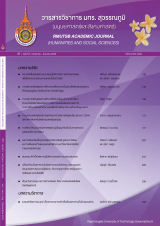การประเมินหลักสูตรบริหารธุรกิจมหาบัณฑิต (หลักสูตรปรับปรุง พ.ศ. 2554) มหาวิทยาลัยเทคโนโลยีราชมงคลสุวรรณภูมิ
Main Article Content
Abstract
งานวิจัยนี้มีวัตถุประสงค์เพื่อประเมินหลักสูตรบริหารธุรกิจมหาบัณฑิต (หลักสูตรปรับปรุง พ.ศ. 2554) มหาวิทยาลัยเทคโนโลยีราชมงคลสุวรรณภูมิ ในองค์ประกอบ 3 ด้าน คือ ด้านปัจจัยนำเข้าของหลักสูตร ด้านกระบวนการดำเนินการเกี่ยวกับหลักสูตร และด้านผลผลิตของหลักสูตร โดยใช้แบบสอบถามในการเก็บรวบรวมข้อมูลจากผู้เกียวข้องกับหลักสูตร 4 ฝ่าย จำนวน 133 คน ได้แก่ 1) ผู้บริหารหลักสูตร/อาจารย์ผู้สอน 2) นักศึกษาปัจจุบัน 3) ศิษย์เก่า 4) ผู้ประกอบการ วิเคราะห์ข้อมูลโดยใช้สถิติเชิงพรรณนา ได้แก่ ความถี่ ร้อยละ ค่าเฉลี่ย และส่วนเบี่ยงเบนมาตรฐาน
ผลการวิจัยพบว่า ผู้บริหารหลักสูตร/อาจารย์ผู้สอน และศิษย์เก่า เห็นด้วยมากที่สุดต่อหลักสูตรบริหารธุรกิจมหาบัณฑิต (หลักสูตรปรับปรุง พ.ศ. 2554) ในทุกด้าน โดยด้านที่มีค่าสูงสุด ได้แก่ ด้านกระบวนการดำเนินการเกี่ยวกับหลักสูตร ในขณะที่นักศึกษาปัจจุบัน เห็นด้วยมากที่สุดต่อด้านผลผลิตของหลักสูตร
ผลการวิเคราะห์ ด้านปัจจัยนำเข้าของหลักสูตร พบว่าผู้บริหารหลักสูตร/อาจารย์ผู้สอน ศิษย์ปัจจุบันและศิษย์เก่า มีความคิดเห็นสอดคล้องกัน โดยเห็นด้วยมากทีสุดต่อคุณสมบัติของผู้เข้าศึกษา/อาจารย์ผู้สอนและกลยุทธ์การสอน ส่วนด้านกระบวนการดำเนินการเกี่ยวกับหลักสูตร พบว่าผู้บริหารหลักสูตร/อาจารย์ผู้สอนเห็นด้วยมากที่สุดต่อการวัดและประเมินผล ในขณะที่นักศึกษาปัจจุบัน และศิษย์เก่าเห็นด้วยมากที่สุดต่อการให้คำปรึกษา สำหรับด้านผลผลิตของหลักสูตรเกี่ยวกับคุณลักษณะของผู้สำเร็จการศึกษา พบว่าผู้บริหารหลักสูตรและอาจารย์ผู้สอน และนักศึกษาปัจจุบัน เห็นด้วยมากที่สุดต่อความสัมพันธ์ระหว่างบุคคล สำหรับศิษย์เก่าและผู้ประกอบการ เห็นด้วยมากที่สุดต่อคุณลักษณะของผู้สำเร็จการศึกษาด้านคุณธรรม จริยธรรม ซึ่งผลของการวิจัยเป็นแนวทางสำหรับผู้บริหารในการปรับปรุงหลักสูตรบริหารธุรกิจมหาบัณฑิตของมหาวิทยาลัยเทคโนโลยีราชมงคลสุวรรณภูมิ ให้มีความเหมาะสมและสอดคล้องกับความต้องการของผู้เรียนและสังคมต่อไป
The assessment of the Master of Business Administration Program (revised curriculum B.E. 2554) Rajamangala University of Technology Suvarnabhumi
This research has a purpose to assess the Master of Business Administration Program (revised curriculum B.E. 2554) Rajamangala University of Technology Suvarnabhumi in 3 aspects namely: 1) the program input factor 2) the program process of the performance and, 3) the program outcome. The questionnaire was used for data collecting from the related person in 4 aspects which were 133 people together; 1) the curriculum administrators and lecturers, 2) the current students, 3) the alumni and, 4) the business entrepreneurs. The obtained data were analyzed through the descriptive statistics; the frequency, the percentage, the mean and the standard deviation.
The research finding revealed that the curriculum administrators/lecturers and alumnus had the highest agreement on the Master of Business Administration Program (revised curriculum B.E. 2554) in every aspect while the highest rate was the curriculum process of performance. Controversy, the current students had the highest rate on the curriculum outcomes.
Considering to the curriculum input found that the curriculum administrators/lectures, current students and alumnus had the highest agreement in the attribution of the students/lectures and teaching strategy. Besides that the curriculum process of performance was found that the curriculum administrators/lecturers had a highest agreement which was the measurement and assessment. Controversy, the current students and alumnus had a highest agreement which was the counseling. Considering to the attribution of the graduates found that the curriculum administrators/lectures and current students had the highest agreement in the aspect of the graduates attribution that the highest rate was the interpersonal. For the alumni and entrepreneurs had the highest rate about the graduates’ attribute which was the virtue and ethnic. The research finding will be a guide for the administrators to improve the Master of Business Administration Program at the Rajamangala University of Technology Suvarnabhumi appropriately for the learners and society.

